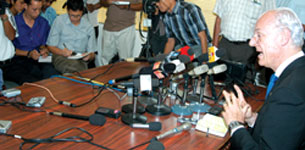|
|
| "I'M NOT DISAPPOINTED": Staffan de Mistura puts on a brave face as he faces reporters before flying back to New York on Thursday. |
The high-level UN peace mission to Nepal wanted a consensus on arms management by the time it left on Thursday. That didn't happen, but the trip was not in vain.
It did inject a sense of urgency to the peace process, and give the issue of demilitarisation a momentum on which future efforts can be built. Given the polarised positions on both sides perhaps it was too much to expect things to be patched up so quickly.
Despite a week of official and behind-the-scenes meetings by de Mistura with the Maoists, the two sides failed to agree on the key issue of arms management. Both sides, however, did reiterate their commitment to the eight-point agreement of 16 June that deals with other political aspects of the peace process.
A UN diplomat said that though it was disappointing, the inability to secure an arms agreement now was not a blow to the peace process. "The issue could be taken up again in the near future," he said.
De Mistura arrived here last week with a mandate to forge a consensus on demilitarisation ahead of constituent assembly elections. Several ideas were floated, including a 'Double Key' approach to arms management.
The Maoists initially agreed to Double Key, but later insisted that the Nepal Army should also be subjected to the same rules. The government and army both said no and the UN apparently saw little reason to push them hard at this point. The meeting between Prime Minister Koirala and Pushpa Kamal Dahal Wednesday evening appears to have been sidetracked by other discussions.
Additionally, rebel negotiators linked arms storage with overarching political issues, calling on the UN and Nepal government to try for a comprehensive 'package' agreement on an interim government, joint command of the two armies and reforms in the Nepal Army.
Asked if his party accepted the double key approach to arms management, Maoist chief negotiator, Krishna Bahadur Mahara told us: "Yes we do, but only if the Nepal Army is subjected to same conditions."
His colleague Deb Gurung elaborated: "We will not agree to a system that separates only us from our arms. Bring a formula equal to both sides, and we have no problems in accepting it."
A senior Nepal government official said that it would be unrealistic to expect the Nepal Army to submit to disarmament. "Everywhere, it has been the rebels who have been disarmed, not the legitimate force."
While the Maoists face considerable pressure from their commanders in the field who do not want to give up their weapons, the government may also have found it hard to convince the Nepal Army about being confined to barracks.
De Mistura is concerned that emerging crises elsewhere in the world will distract the UN. Secretary General Kofi Annan has taken a keen interest in Nepal, and he thinks his retirement at the end of this year could leave the future uncertain.
"Will Nepal be a priority for a new secretary general? We don't know," said a source close to the UN mission, "this is the reason why de Mistura was really appealing for a consensus on the arms management. That would have strengthened the UN's role in Nepal and would have contributed towards lasting peace."
The 'Double Key' forumla
The double key formula has widely been used in conflict resolution in many parts of the world. Under this system combatant armies are confined to separate barracks which have armouries in which each weapons inventory is stored under two sets of locks. One set of keys is held by the respective combatant army and the other by UN monitors.
The disagreement in Nepal is over the Maoists insisting that the Nepal Army be subject to the same procedure of weapon storage as itself, and the military saying that as the army of a legitimate state it can't be treated at the same level as a rebel force.
Farewell to arms?
The high-level UN mission lead by Staffan de Mistura returned to New York Thursday without being able to persuade the Maoists and the government to come up with a common position on demilitarising before elections.
"There is a lack of trust on the techniques of arms management," de Mistura told reporters at the airport on Thursday, but added, "on this the UN can help."
The visit did provide a sense of urgency to the peace process which was stuck because of a deadlock over arms. De Mistura tried to hurry things up by hinting at a Thursday deadline, but analysts said it may have been too much to expect a breakthrough so quickly.
"We're hoping there is a momentum, I'm not disappointed," de Mistura said, "if they come up with some kind of consensus while we are back in New York we will take that into account."
The UN team spent a week in Nepal and actively tried to bring the two sides together. It will now report to Secretary General Kofi Annan and discuss a possible future UN monitoring mission to oversee the peace process.



